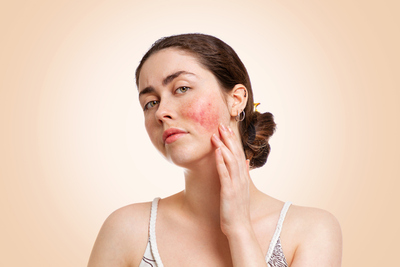The Top 10 Questions about Rosacea

April is Rosacea Awareness Month, and in light of the fact that rosacea currently affects more than 16 million Americans, we’ve put together a list of the top 10 questions our patients have about this common skin condition.
-
What are the symptoms of rosacea?
The most common symptom of rosacea is facial redness. For some people, it begins as a red spot or patch on one part of the face, which soon spreads. About half of rosacea patients experience dry, flaky skin as well. Other common symptoms include burning, stinging, and itching. Some people experience swelling.
-
Where does rosacea occur?
Rosacea most often appears on the face. While it’s less common, it can affect other parts of the body as well: specifically the ears, scalp, neck, chest, and back. Ocular rosacea is a form of the condition that affects the eyes, making them look bloodshot or watery. This can lead to the eyes feeling dry, gritty, and itchy. It’s very important to seek treatment for ocular rosacea, as it can damage your vision if left untreated.
-
What causes rosacea?
While we still don’t know exactly what causes rosacea, there are a few theories. One of them has to do with the blood vessels in your face: when they swell up or dilate due to sun damage, bacteria, allergies, or other triggers, more blood flows near the surface of the skin. And it’s this increased blood flow that makes the skin appear red. There’s also some evidence that rosacea is genetic.
-
Is rosacea contagious?
Rosacea is not contagious, so you don’t have to worry about getting it from someone else or passing it along.
-
How long does rosacea last?
Rosacea is a chronic condition, which means it can last indefinitely. Take comfort, though: there’s a good chance you won’t be stuck with rosacea symptoms your whole life. A study by The National Rosacea Society found that about half of rosacea patients no longer had the condition after nine years. Now, while that may seem like a long time, those patients probably didn’t have active rosacea flare-ups every day. With treatment and lifestyle changes, rosacea symptoms can be managed effectively, and patients who receive long-term, consistent treatment are less likely to have regular flare-ups.
-
Is rosacea related to other skin issues?
- Acne: Although it is possible to experience rosacea and acne at the same time, the two conditions usually appear separately. If they do occur together, you’ll want to see a dermatologist, as each condition may require a separate form of treatment.
- Eczema: There’s no connection between rosacea and ordinary eczema, although it’s not uncommon to experience seborrheic dermatitis (also known as seborrheic eczema) simultaneously with rosacea.
- Lupus: Lupus and rosacea can present similar symptoms (though a dermatologist will be able to tell the difference) so it’s not surprising that they’re sometimes mistaken for each other. There’s no connection between the two.
- Skin cancer: As far as we know, there’s no link between rosacea and skin cancer. Then again, rosacea patients may be more likely to develop skin cancer simply because they tend to have light-sensitive skin.
-
What triggers rosacea flare-ups?
If you have rosacea, it’s worth keeping a log to record when flare-ups occur and what triggers may have caused them. Triggers tend to be different for everyone, and among them are things you can and can’t control. For instance, some common triggers include spicy foods, hot drinks, alcohol, heavy exercise, and hot baths. Others are sun exposure, wind, hot or cold weather, and stress.
-
Is rosacea related to allergies?
Allergies cause inflammation, which often triggers a rosacea flare-up. For this reason, avoiding allergens may reduce your symptoms.
-
Can rosacea be cured?
There’s no cure for rosacea, though its symptoms can be managed very successfully.
-
How is rosacea treated?
Treatment for rosacea tends to be different for everyone. Your dermatologist can suggest a treatment plan based on the severity and frequency of your symptoms and which triggers you respond to. For some people, oral and topical medication – including antibiotics – is effective for reducing redness and bumps. For others, laser therapy can make inflamed blood vessels less visible. Your dermatologist will also discuss lifestyle factors that may trigger your rosacea flare-ups and suggest ways to minimize these. With some patience, dedication, and a little outside help, you’re well on your way to showing rosacea who’s boss.
If you think you’re suffering from rosacea, make an appointment with one of our dermatology providers to devise a treatment plan. Call 844-DERM-DOC to schedule an appointment.
